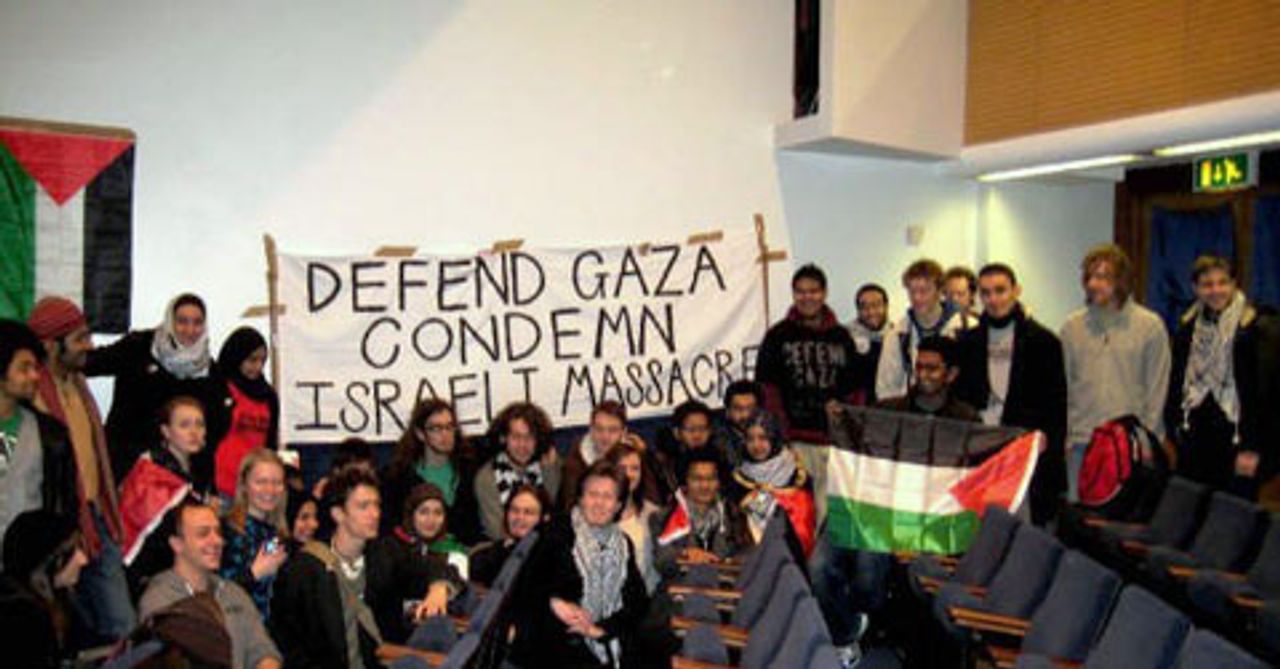Students at two British universities have carried out occupations in protest at the war in Gaza. More are being planned on other campuses.
 Occupation committee at the London School of Economics
Occupation committee at the London School of EconomicsStudents at the School of Oriental and Asian Studies in London started their occupation on Tuesday issuing a leaflet explaining that "the current war of Israel against Gaza is yet another manifestation of the injustice which has been occurring un-remarked by the Western press since the establishment of the state of Israel, and the simultaneous expulsion of almost 914,000 Palestinians from their homes in 1948." It condemned Israel's violent seizures of land and the detention and forced exile of hundreds of thousands of Palestinians since then.
"World leaders have refused to condemn outright the massive overreaction by the Israeli state to the rocket attacks by Hamas; a manifestation of the frustration and fear of the occupied peoples. The Israelis are backed by the most powerful government in the world, the Palestinians have nothing to defend themselves but a few simple rockets, stones, and their bodies," the statement continued.
"That is why we must protest, and why we must make our voices heard using any means necessary; because this conflict has never been equal. Because we stand on the side of the oppressed," the statement concluded.
SOAS student Haroun Lazim explained that the occupation had erupted over three issues—the illegal occupation of Palestinian land and the atrocities being committed in Israel, an exhibition "We Were There" held in the university's Brunei gallery by the Ministry of Defence (MOD) promoting the role played by ethnic minorities in the UK's colonialist wars and the privatisation of the university facilities.
Haroun said the protesters had issued a set of demands to SOAS director Professor Paul Webley, including the publication of a statement condemning Israel's actions, the closure of the MOD exhibition and greater student control of the university facilities.
He said that several students had decided to carry out an occupation similar to the one at the university in 2000 protesting against tuition fees because several motions had been passed by the Students' Union supporting the Palestinians, criticising privatisation and addressing other issues.
The students set up an alternative exhibition to the one organised by the MOD "to display solidarity with the people of Gaza" which was banned to any "uniformed presence" and organised several meetings. They called "for other students to join us here and in similar demonstrations at other universities."
Students at the London School of Economics responded to the SOAS call by occupying one of the main lecture theatres. A statement from the occupation committee said, "LSE is an institution founded on the Fabian values that were the precursor of the human rights agenda of modern politics. LSE must restate those values and condemn state criminality. It is not a matter of politics, it is a matter of humanity." The statement demanded that the university condemn the attack on Gaza, stop investments in arms companies that supply the Israeli military and increase the number of scholarships available to Palestinian students.
So far the SOAS and LSE authorities seemed to have backed down from any confrontation with the students. Although LSE director Howard Davies has warned that "were there to be any damage (which would surprise me) or disruption of the education of other students, we might have to take a different view, but I am sure that is not in your minds."
Both institutions have insisted that they will not condemn the Israeli aggression in Gaza. SOAS's Webley says that, "it would be inappropriate for the School to make any overtly political statement as an institution." Davies insists that, "the School's Council has reiterated its position ... that the School will not take a position on the Israel/Palestine dispute."
But as the LSE student statement makes clear "this is in stark contrast to an overtly political statement issued by Davies in May 2007 condemning a UCU (University and College Union) resolution concerning the Israeli Occupation, and previous condemnations by LSE of South African Apartheid and the Tiananmen Square massacre in the 1980s."
Davies says he is quite happy for the LSE to become involved in "legitimate humanitarian charity" and for students to send surplus books and computers students to "deserving institutions" in Palestine. Students should be wary that their courageous and principled political stand does not become co-opted into a charity exercise and should consider the perspective based on the unity of the Jewish and Arab working classes in the struggle for a Socialist Federation of the Middle East, which is bound up with the overthrow of capitalism across the world.
Fill out the form to be contacted by someone from the WSWS in your area about getting involved.
